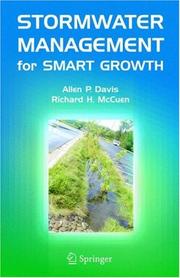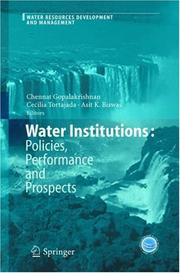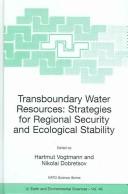| Listing 1 - 3 of 3 |
Sort by
|

ISBN: 1280312319 9786610312313 0387275932 038726048X 1441938575 Year: 2005 Publisher: New York : Springer Science,
Abstract | Keywords | Export | Availability | Bookmark
 Loading...
Loading...Choose an application
- Reference Manager
- EndNote
- RefWorks (Direct export to RefWorks)
Land development to support population increases and shifts requires changes to the hydrologic cycle. Increased impervious area results in greater volumes of runoff, higher flow velocities, and increased pollutant fluxes to local waterways. As we learn more about the negative impacts of these outcomes, it becomes more important to develop and manage land in a smart manner that reduces these impacts. This text provides the reader with background information on hydrology and water quality issues that are necessary to understand many of the environmental problems associated with land development and growth. The variability of runoff" flows and pollutant concentrations, however, makes the performance of simple technologies erratic and predicting and modeling their performance difficult. Chapters on statistics and modeling are included to provide the proper background and tools. The latter chapters of the text cover many of the different technologies that can be employed to address runoff flows and improve water quality. These chapters take a design approach with specific examples provided for many of the management practices. A number of methods are currently available for addressing the problems associated with stormwater runoff quality from urban areas; more continue to be developed as research is advanced and interest in this subject continues to surge. Traditionally, techniques for the improvement of runoff quality were borrowed applications from water and wastewater treatment, such as large sedimentation ponds Recently, increased interest has been placed on using natural systems to improve water quality.
Urban runoff --- Land use --- Water quality management. --- Hydrology --- Management. --- Environmental aspects. --- Statistical methods. --- Mathematical models. --- Water quality --- Water quality control --- Management --- Sewage disposal --- Water conservation --- Water-supply --- Land --- Land utilization --- Use of land --- Utilization of land --- Economics --- Land cover --- Landscape assessment --- NIMBY syndrome --- Stormwater management, Urban --- Rain gardens --- Civil engineering. --- Environmental pollution. --- Civil Engineering. --- Water Policy/Water Governance/Water Management. --- Waste Water Technology / Water Pollution Control / Water Management / Aquatic Pollution. --- Chemical pollution --- Chemicals --- Contamination of environment --- Environmental pollution --- Pollution --- Contamination (Technology) --- Asbestos abatement --- Bioremediation --- Environmental engineering --- Environmental quality --- Factory and trade waste --- Hazardous waste site remediation --- Hazardous wastes --- In situ remediation --- Lead abatement --- Pollutants --- Refuse and refuse disposal --- Engineering --- Public works --- Environmental aspects --- Environmental management. --- Water pollution. --- Aquatic pollution --- Fresh water --- Fresh water pollution --- Freshwater pollution --- Inland water pollution --- Lake pollution --- Lakes --- Reservoirs --- River pollution --- Rivers --- Stream pollution --- Water contamination --- Water pollutants --- Water pollution --- Waste disposal in rivers, lakes, etc. --- Environmental stewardship --- Stewardship, Environmental --- Environmental sciences

ISBN: 1280304987 9786610304981 3540265678 3540238115 3642062776 Year: 2005 Publisher: Berlin : Springer,
Abstract | Keywords | Export | Availability | Bookmark
 Loading...
Loading...Choose an application
- Reference Manager
- EndNote
- RefWorks (Direct export to RefWorks)
It is being increasingly realised that water is likely to be one of the most critical resource issues for the first half of the twenty-first century. Accelerating demand for water for various uses and user groups and ineffective measures to address - ter quality decline from point and non-point sources of pollution, have made water management more complex and difficult than ever before in human history. All the current trends indicate that water management will become even more c- plex in the future because of society’s higher demands for good quality water, and new and emerging impacts on the water sector due to the forces of globalisation. These include the liberalisation of trade in agricultural and manufactured products, information and communication revolution, and technological developments in - eas traditionally not considered to be water-oriented, like biotechnology. Impacts of these new and emerging forces on the water sector are still not fully understood or appreciated at present, but they are likely to change water use practices d- matically in many countries of the world during the coming decades.
Water resources development. --- Geography --- Earth & Environmental Sciences --- Physical Geography --- Water-supply --- Management. --- Earth sciences. --- Environmental management. --- Political science. --- Hydrogeology. --- Environmental law. --- Environmental policy. --- Economic policy. --- Environmental economics. --- Earth Sciences. --- Water Policy/Water Governance/Water Management. --- Environmental Economics. --- Political Science. --- Environmental Law/Policy/Ecojustice. --- Economic Policy. --- Energy development --- Natural resources --- Hydraulic engineering. --- Economic nationalism --- Economic planning --- National planning --- State planning --- Economics --- Planning --- National security --- Social policy --- Environment law --- Environmental control --- Environmental protection --- Environmental quality --- Environmental policy --- Law --- Sustainable development --- Administration --- Civil government --- Commonwealth, The --- Government --- Political theory --- Political thought --- Politics --- Science, Political --- Social sciences --- State, The --- Engineering, Hydraulic --- Engineering --- Fluid mechanics --- Hydraulics --- Shore protection --- Law and legislation --- Environmental aspects --- Economic aspects --- Environment and state --- Environmental management --- State and environment --- Environmental auditing --- Environmental stewardship --- Stewardship, Environmental --- Environmental sciences --- Management --- Geohydrology --- Geology --- Hydrology --- Groundwater --- Government policy

ISBN: 1402030800 1402030819 9786610283309 1280283300 1402030827 Year: 2005 Volume: 46 Publisher: Dordrecht ; [Great Britain] : Springer,
Abstract | Keywords | Export | Availability | Bookmark
 Loading...
Loading...Choose an application
- Reference Manager
- EndNote
- RefWorks (Direct export to RefWorks)
After the sovjet era and since their independence the new Central Asian countries are rebuilding a system of water resources management: an important challenge for the development of the whole region. The NATO workshop held on 25-27 August 2003 by the Federal Agency for Nature Conservation, Germany and the Siberian Branch of the Russian Academy of Science, attended by experts from five Central Asian countries, Russia, six Western European countries, the US and the UNEP offered water engineers and nature scientists as well as economic and political scientists and practitioners from water administrations and international river commissions to meet in Novosibirsk and develop sustainable approaches in the management of Central Asian water resources. This book presents important aspects of transboundary water resources, i.e. the global water crisis: problems and perspectives; regional experiences in solving water problems in Central Asia; problems and management of transboundary water resources; ecological and economic aspects of water management; scientific analysis and tools of water changes; strategic implications of water access arisen during the workshop. A final recommendation in the area of equitable sharing of benefits, monitoring and data collection as well as proposals for Central Asia transboundary waters programme were set in the book as the main result of the meeting.
Water-supply --- Water resources development --- Eau --- Ressources en eau --- International cooperation --- Congresses. --- Approvisionnement --- Coopération internationale --- Congrès --- Exploitation --- Water resources development. --- Water-supply. --- Environmental Sciences --- Environmental Engineering --- Civil & Environmental Engineering --- Earth & Environmental Sciences --- Engineering & Applied Sciences --- Coopération internationale --- Congrès --- EPUB-LIV-FT Ecological LIVECOLO SPRINGER-B Transboundary resources stability water --- Availability, Water --- Water availability --- Water resources --- Environment. --- Environmental management. --- Water pollution. --- Social sciences. --- Environment, general. --- Water Policy/Water Governance/Water Management. --- Environmental Management. --- Waste Water Technology / Water Pollution Control / Water Management / Aquatic Pollution. --- Social Sciences, general. --- Energy development --- Natural resources --- Public utilities --- Water utilities --- Environmental sciences. --- Environmental pollution. --- Behavioral sciences --- Human sciences --- Sciences, Social --- Social science --- Social studies --- Civilization --- Chemical pollution --- Chemicals --- Contamination of environment --- Environmental pollution --- Pollution --- Contamination (Technology) --- Asbestos abatement --- Bioremediation --- Environmental engineering --- Environmental quality --- Factory and trade waste --- Hazardous waste site remediation --- Hazardous wastes --- In situ remediation --- Lead abatement --- Pollutants --- Refuse and refuse disposal --- Environmental stewardship --- Stewardship, Environmental --- Environmental sciences --- Management --- Environmental science --- Science --- Environmental aspects --- Aquatic pollution --- Fresh water --- Fresh water pollution --- Freshwater pollution --- Inland water pollution --- Lake pollution --- Lakes --- Reservoirs --- River pollution --- Rivers --- Stream pollution --- Water contamination --- Water pollutants --- Water pollution --- Waste disposal in rivers, lakes, etc. --- Transboundary water resources --- Ecological stability --- Balance of nature --- Biology --- Bionomics --- Ecological processes --- Ecological science --- Ecological sciences --- Environment --- Environmental biology --- Oecology --- Population biology --- Ecology
| Listing 1 - 3 of 3 |
Sort by
|

 Search
Search Feedback
Feedback About UniCat
About UniCat  Help
Help News
News